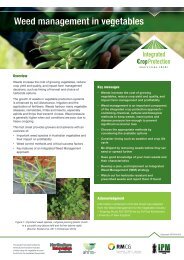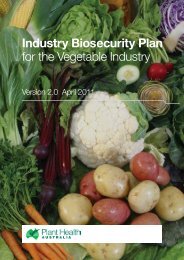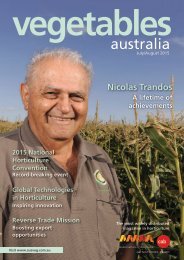vegetables
VA-NovDec2015
VA-NovDec2015
You also want an ePaper? Increase the reach of your titles
YUMPU automatically turns print PDFs into web optimized ePapers that Google loves.
12<br />
WEEDS ARE A FACT OF LIFE FOR MANY VEGETABLE GROWERS, WITH THE POTENTIAL<br />
TO AFFECT THE COST, YIELD AND QUALITY OF CROPS. A RECENT SCOPING STUDY<br />
LOOKED AT THE MOST COMMON WEEDS THROUGHOUT AUSTRALIA AND THE<br />
CURRENT MANAGEMENT STRATEGIES IMPLEMENTED BY GROWERS, TO HELP<br />
IDENTIFY PRIORITIES FOR FUTURE RESEARCH.<br />
Weeds are a persistent<br />
problem, requiring<br />
constant attention and careful<br />
management. If not dealt with<br />
effectively, they can have a<br />
devastating effect on crop<br />
profitability, yield and quality.<br />
In response to this issue, a<br />
recent scoping study, entitled<br />
Weed Management for the<br />
Vegetable Industry, was led<br />
by Dr Paul Kristiansen of the<br />
University of New England in<br />
New South Wales, with the aim<br />
of identifying the most important<br />
weed species in Australian<br />
vegetable production and the<br />
methods currently used to<br />
control them. The study also<br />
looked at gaps in the current<br />
knowledge of weed control and<br />
identified key R&D priorities.<br />
“Vegetable production is<br />
different to a lot of other ag<br />
industries,” Dr Kristiansen said<br />
of his reasons for initiating<br />
the study. “It’s very intense;<br />
there’s a lot more ploughing<br />
and a lot more changing of<br />
the environment that can be<br />
quite challenging for farmers.<br />
A lot of the practices are a bit<br />
traditional, so we were thinking<br />
about some of the other<br />
industries and how they’ve<br />
modernised the way they<br />
manage weeds.”<br />
The project comprised a<br />
review of literature, a national<br />
survey of vegetable growers,<br />
focus groups and farm visits<br />
in major vegetable producing<br />
regions across Australia.<br />
Common weeds<br />
The national survey showed<br />
that the most commonly found<br />
weeds affecting vegetable<br />
crops were annual or biennial<br />
broadleaf species, including<br />
Fat hen, Stinging nettle, Mallow<br />
R&D<br />
Farm Productivity,<br />
Resource Use<br />
& Management<br />
Managing weeds:<br />
An integrated approach<br />
and Pigweed. These weed types<br />
can be extremely problematic<br />
as they seed heavily and, unlike<br />
grass and grass-like weeds, are<br />
more difficult to control using<br />
selective herbicides.<br />
The Sedge nutgrass was also<br />
commonly reported, which is<br />
problematic due to its persistent<br />
underground root system.<br />
Effective strategies<br />
When dealing with these<br />
common weeds, the current<br />
strategy of most growers is to<br />
use a mixture of herbicides,<br />
tillage or cultivation,<br />
hand weeding, plastic or<br />
biodegradable mulch (where<br />
applicable) and crop rotation.<br />
Other methods, such as<br />
fumigation, biofumigation,<br />
stale and false seedbeds and<br />
farm hygiene may also be used<br />
successfully.<br />
The project found that nearly<br />
all growers integrate a number<br />
of control methods, because no<br />
single technique will effectively<br />
manage the weed issue<br />
throughout the entire growing<br />
season. This is known as<br />
Integrated Weed Management<br />
(IWM) and, while relatively<br />
little attention has been paid<br />
to the practice in the vegetable<br />
industry, the grain and cotton<br />
industries have demonstrated<br />
that IWM is key to sustainable<br />
productivity.<br />
Integrated Weed<br />
Management<br />
Most growers are already using<br />
a basic IWM approach, relying<br />
on a few conventional practices<br />
such as herbicides, tillage<br />
and hand weeding. However,





